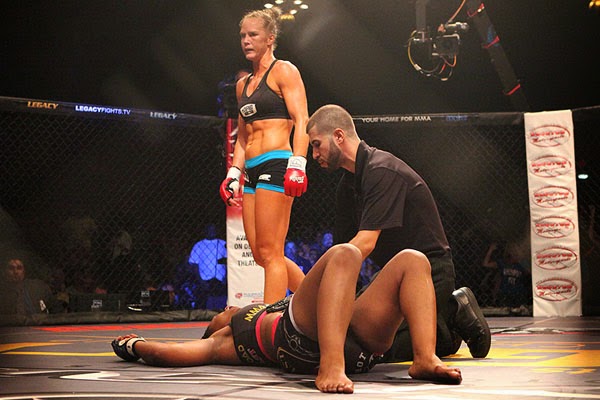The Ultimate Fighting Championship prides itself on its success at breaking through into the world of mainstream sports. And though the promotion hasn’t had to deal with many issues that have affected some of the other “major league” sports organizations, it has had to deal with some. One such situation concerns the promotion’s contract negotiations with Holly Holm, which is an example of how the development of mixed martial arts as a mainstream sport has caused fighters to conduct business the way other professional athletes do.
Holly Holm is one of the best female combat sports athletes in the game today. During her professional boxing career, she put together a 33-2 record that saw her hold several different welterweight titles. She announced that she was transitioning into mixed martial arts in 2011, but didn’t get the kind of mainstream coverage that one would expect when a high-level boxer decides to change sports. Yet in a lot of ways, that would play to her benefit.
 Outside of the mainstream spotlight, Holm began fighting for smaller MMA promotions, and racked up six straight wins, including five by some form of knockout . During this 6-0 run, she has displayed the kind of striking that has many people believing she is the best striker in women’s MMA. That has attracted the attention of the powers that be within the UFC. However, unlike other 6-0 fighters, who come running when the UFC comes calling, Holm and her management were ready to play hard ball when it came to negotiating the best possible UFC deal for the former world champion.
Outside of the mainstream spotlight, Holm began fighting for smaller MMA promotions, and racked up six straight wins, including five by some form of knockout . During this 6-0 run, she has displayed the kind of striking that has many people believing she is the best striker in women’s MMA. That has attracted the attention of the powers that be within the UFC. However, unlike other 6-0 fighters, who come running when the UFC comes calling, Holm and her management were ready to play hard ball when it came to negotiating the best possible UFC deal for the former world champion.
 Lenny Fresquez, who has represented Holm during these negotiations, has gone on the record to say that the UFC offered Holm a contract during recent meetings. Holm’s first fight in the Octagon would be a title shot against current women’s bantamweight champion Ronda Rousey. However, the sticking point in negotiations was that Fresquez wanted a pay scale that would match that type of placement on a UFC card. “It’s my job to put Holly in the right hands. She’s got to make at least what she makes here, and we’re close on that,” stated Fresquez. “The thing is making sure we are paid for Ronda. We’ve got to get paid to fight Ronda.”
Lenny Fresquez, who has represented Holm during these negotiations, has gone on the record to say that the UFC offered Holm a contract during recent meetings. Holm’s first fight in the Octagon would be a title shot against current women’s bantamweight champion Ronda Rousey. However, the sticking point in negotiations was that Fresquez wanted a pay scale that would match that type of placement on a UFC card. “It’s my job to put Holly in the right hands. She’s got to make at least what she makes here, and we’re close on that,” stated Fresquez. “The thing is making sure we are paid for Ronda. We’ve got to get paid to fight Ronda.”
UFC President Dana White’s public reaction, however, was par for the course for situations like these.
“Not interested whatsoever,” was White’s response when asked about Holm joining the UFC roster.
Fresquez’s statements suggest that Holm is making a substantial amount of money competing on smaller circuits. So while fighting in the Octagon does give her the best chance to gain mainstream fame, Holm does have options outside of the UFC if the UFC doesn’t want to meet her financial demands.
Notwithstanding Mr. White’s comments, the UFC should get used to free agents being less willing to accept the promotion’s entry-level contracts, as more and more fighters are gaining a level of fame outside of the organization. Rather than hiring managers that are “friendly” with the UFC, these athletes are choosing to be represented by firms that are trained in sports business. This training leads them towards the goal of gaining the best possible deals for their clients, rather than merely getting them into the UFC, and hoping that it all works out. That is exactly what these athletes need at this stage of the sport — representation that is thinking about their careers, and prepared to use all possible leverage to demand more during contract negotiations.
Prizefighting is a career choice where a participant has a very short shelf life. As fighters collectively begin to manage their careers similarly to athletes in other sports, promotions will be forced to negotiate instead of dictate what these fighters will and will not do. And though the UFC brass will potentially badmouth Holly Holm, the stance that her management is willing to take on her behalf is a step in the right direction, as these kinds of situations have almost always improved sports in the long run.




